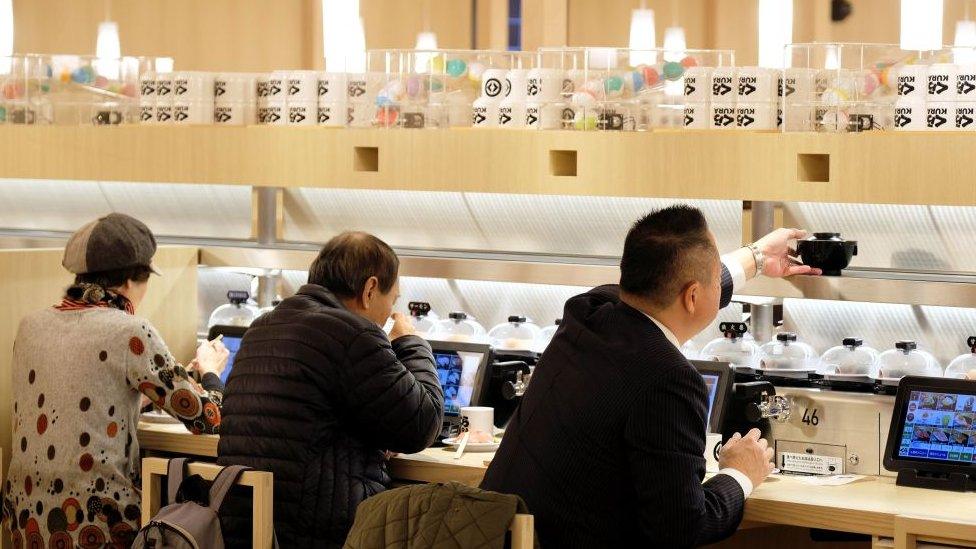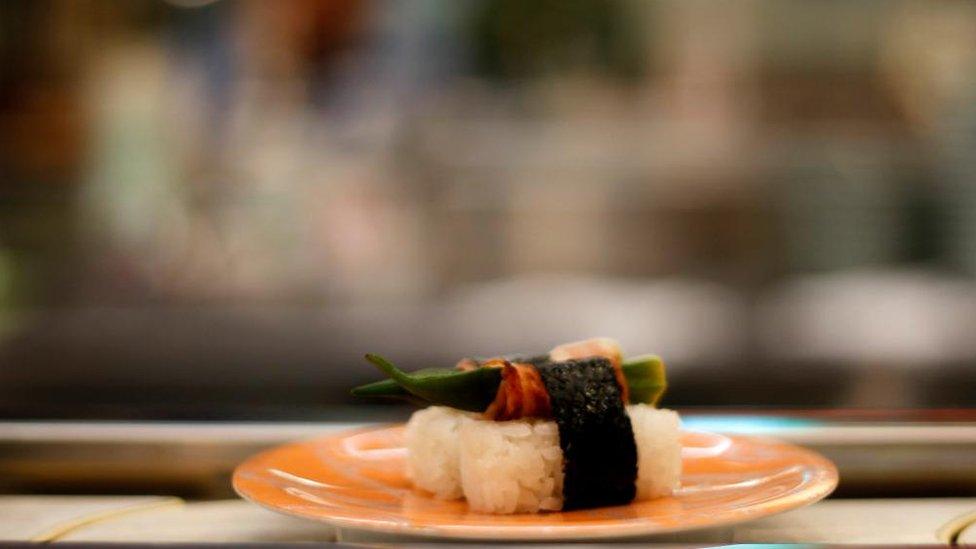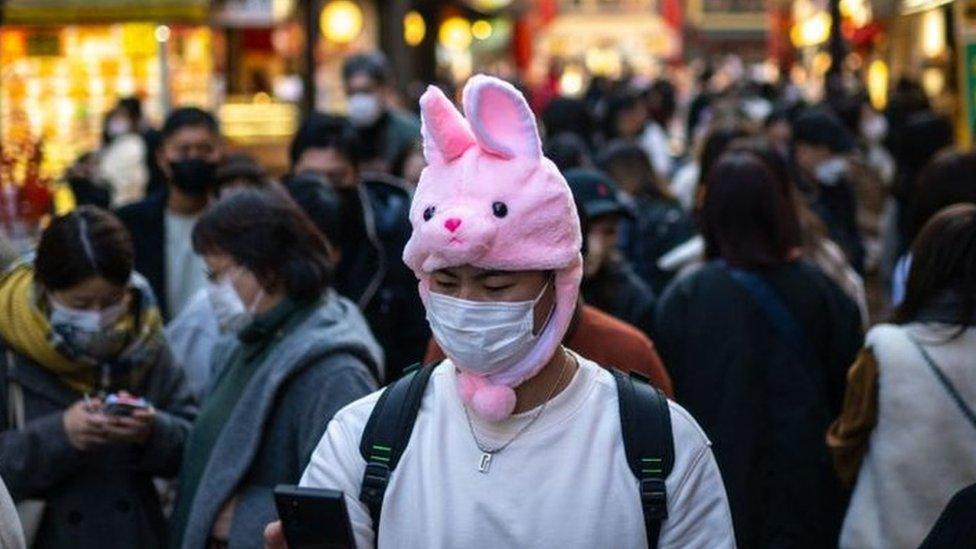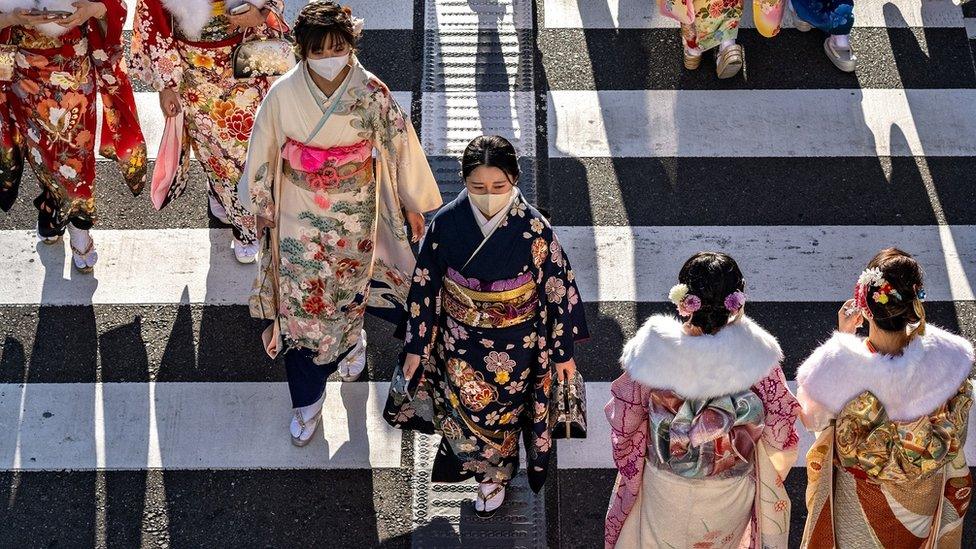'Sushi terror' pranks outrage Japan as police make arrests
- Published

It's feared a wave of unhygienic pranks will scare off sushi train customers
Japanese police have arrested three people over "sushi terror": viral, unhygienic pranks that are threatening the world-famous feature of sushi conveyor belt restaurants.
Last month, a video of a man licking a soy sauce bottle on a sushi conveyor went viral, sparking outrage.
In the video, he can be seen squashing sushi dishes at a Kura Sushi restaurant branch.
Since then, dozens of such videos have proliferated sparking public concern.
Incidents filmed include diners - many of whom are children and young people - spoiling others' orders by touching sushi dishes passing by.
One video which emerged last month showed a customer putting wasabi on another's dish, while another person licked the presented chopsticks.
In another video, filmed at a Sushiro chain outlet, a diner is seen rubbing saliva on passing sushi pieces.
The viral trend has horrified many Japanese and spurred action from several conveyor-belt sushi chains - known as kaitenzushi locally.
"I know people from overseas look forward to eating sushi here so as a Japanese person, I am ashamed of such actions," one woman Yukari Tanaka told the BBC.
Another person, Nana Kozaki, said: "Kaitenzushi is Japanese culture we can be proud of but actions of few people like that really ruins that."
Others said they were "a bit scared" by the trend - admitting they were less willing to go to restaurants.
Japan is renowned for its exacting cleanliness standards and culinary etiquette.
So the "sushi terrorism" pranks have not only shocked millions around the country but also led to falls in share prices of companies like the Sushiro chain.
This has spurred several kaitenzushi chains to make public appeals for offenders to stop their food sabotage.
Some eateries have even made the choice to stop operating their main attraction altogether - with sushi conveyor belts coming to a halt across the country.
In eastern Japan, the Choushimaru chain said it would stop using its conveyor belts altogether after a customer placed a cigarette butt in a jar of pickled ginger.
Staff will now bring dishes to customers directly - and only hand out condiments and sauces when they've taken their seats.
A spokesman for the Kura Sushi - the restaurant chain targeted by those arrested on Wednesday - said the viral video trend was "extremely dangerous" and posing a threat to the foundation of the conveyor-belt restaurant model.
"Conveyor belt sushi is something we are proud of as part of Japanese culture. We want to make sure our customers can eat sushi delivered on the belt safely and comfortably," he said.
Several sushi chains have already threatened legal action - but Wednesday's detentions are believed to be the first arrests of offenders.
Police in the central Japanese city of Nagoya allege Ryoga Yoshino, 21, licked a communal soy sauce bottle at a Kura Sushi conveyor-belt sushi restaurant on 3 February.
Two minors aged 19 and 15 were also involved. Police said their actions constituted obstruction of business under Japan's Penal Code.
All of the suspects admitted to the wrongdoing, police said. One also reportedly apologised for his actions.
Restaurant-owning companies had already been struggling - with global supply chains under strain to a weaker yen, the war in Ukraine and the coronavirus pandemic.
Many had to raise prices on their cheapest offerings last year.
Now they face another struggle with the wave of unhygienic pranks.
It's led to restaurants around the country scrambling to reassure customers of their hygiene standards.
The Sushiro chain changed its service rules last month, requiring diners to collect their own utensils and condiments from staff to cut down on potential sabotage attempts.
Kura Sushi has now also developed an alert system, where some of its conveyor belts will now be equipped with sensors and cameras.
If a person is caught returning a plate that has been tampered with, an alert will be sent to the chain's offices in Saitama prefecture, near Tokyo and Osaka. The affected restaurant would also be informed, Kura Sushi said.
The company said the new sensors would also be able to identify the specific plate and seat number affected.
Related topics
- Published3 February 2023

- Published20 January 2023

- Published20 January 2023
